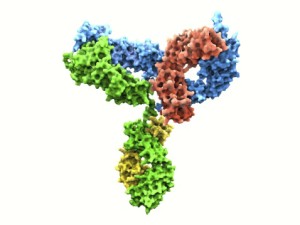Delayed hemolytic transfusion reactions (DHTR) in patients with sickle cell disease can lead to multiple organ failure and may be fatal, especially when hyperhemolysis is present. Antibodies leading to the destruction of autologous or transfused RBCs are not detectable in approximately one-third of affected patients.
Treatment for DHTR has not been defined, but inhibiting complement activation with eculizumab (an anti-C5 monoclonal antibody) may help to minimize RBC hemolysis. Doctors in France recently described three sickle cell patients with DHTRs that were treated with eculizumab. The terminal pathway complement was activated in all three patients. After eculizumab treatment, DHTR symptoms including hemolysis decreased in two patients. Eculizumab treatment also reduced hemolysis in the third patient, however, this patient died from an infection. Formal evaluation of eculizumab treatment for DHTRs in sickle cell patients is warranted.
Reference

